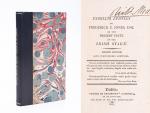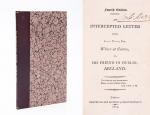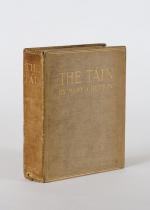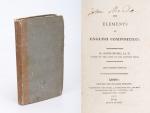Talis Qualis; or Tales of the Jury Room.
First Edition, published posthumously. Dublin, James Duffy & Sons, no year [c. 1842]. 8°. Frontispiece and titlepage are original steel engravings, followed by 463 pages. Original publisher’s binding. Green cloth with gilt lettering and ornament on spine. Beautifully tooled boards with irish harp embossed on frontcover. Excellent condition with only minor signs of external wear. Name of preowner on endpaper (W. Collins).
EUR 145,--









![[Heaney, T.P. Flanagan, RHA, PPRUA. [Signed by Seamus Heaney and T.P.Flanagan]](/images/thumbnails/29397AB.jpg)
![Lysaght, The Marram-Clocks [Signed].](/images/thumbnails/29405AB.jpg)

![W.B.Yeats - Drømmerier over barneår og ungdom. [First Danish Edition of "Reveries over Childhood and Youth"].](/images/thumbnails/29470AB.jpg)
![[Mac Liammoír, Micheál] Ó Floinn, Tomás - Scéalaíocht na Ríthe - [Stories of the Kings].](/images/thumbnails/29473AB.jpg)






